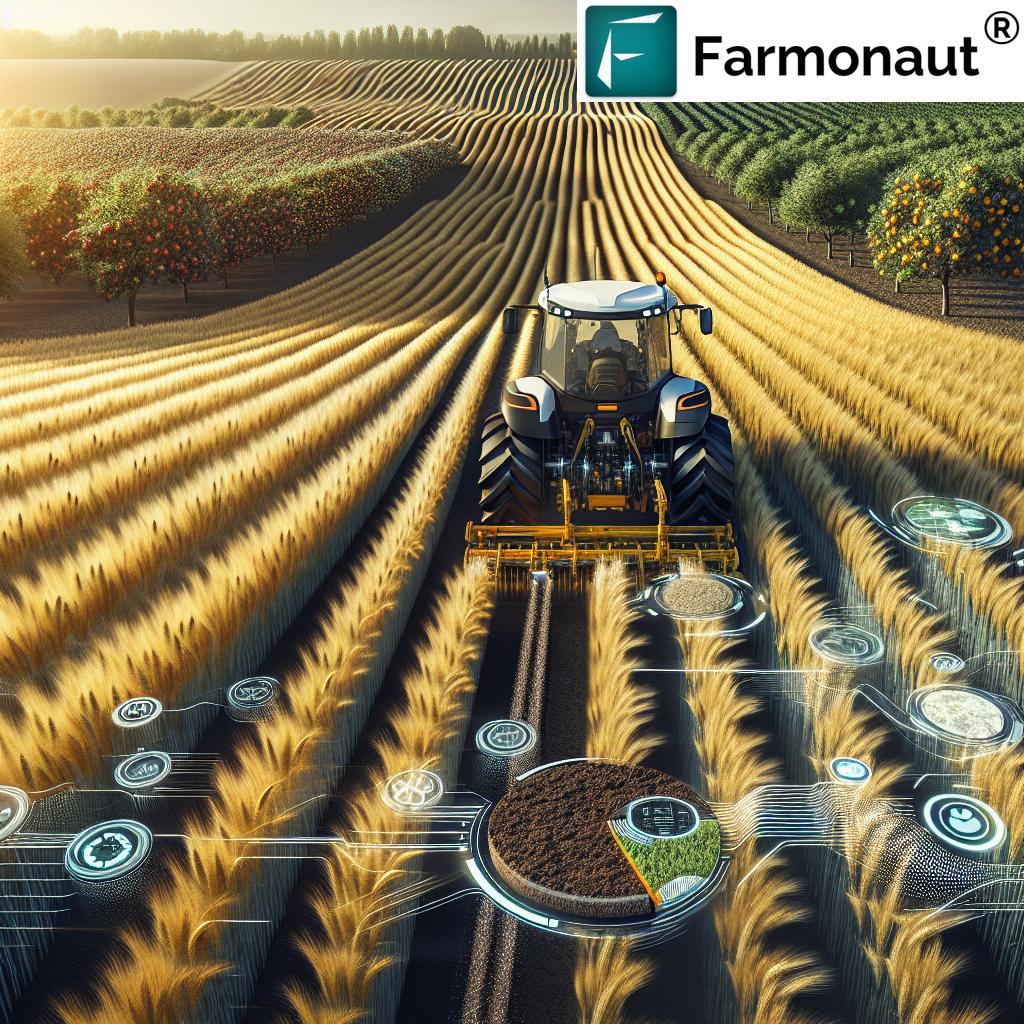Revolutionizing Agriculture: Organic Solutions and Live Bacterial Biofertilizers for Sustainable Farming
In the ever-evolving world of agriculture, we at Farmonaut are excited to present a comprehensive guide on revolutionizing farming practices through organic solutions and live bacterial biofertilizers. As pioneers in agricultural technology, we understand the importance of sustainable farming methods that not only enhance crop productivity but also promote environmental stewardship. Join us as we explore the cutting-edge innovations in organic farming and discover how these solutions can transform your agricultural operations.

“Live bacterial biofertilizers can increase crop yields by up to 30% while reducing chemical fertilizer use by 50%”
The Power of Organic Farming Solutions
Organic farming solutions have gained tremendous popularity in recent years, and for good reason. These methods offer a sustainable approach to agriculture that works in harmony with nature, promoting soil health, biodiversity, and overall ecosystem balance. Let’s delve into some key components of organic farming:
- Organic Seeds: The foundation of any successful organic farm begins with high-quality organic seeds. These seeds are produced without the use of synthetic chemicals or genetic modification, ensuring a pure and natural start to your crop production.
- Biofertilizers: These are natural fertilizers containing living microorganisms that enhance soil fertility and plant growth. They play a crucial role in sustainable agriculture by improving nutrient availability and soil structure.
- Organic Pest Control: Instead of harmful chemical pesticides, organic farming relies on natural methods to manage pests and diseases, such as biological control agents, trap crops, and companion planting.
- Soil Health Improvement Techniques: Practices like crop rotation, cover cropping, and composting are essential for maintaining and improving soil health in organic systems.
By incorporating these organic farming solutions, farmers can significantly reduce their reliance on synthetic inputs while promoting long-term soil fertility and environmental sustainability.
Live Bacterial Biofertilizers: Nature’s Powerhouse
One of the most exciting innovations in sustainable agriculture is the development of live bacterial biofertilizers. These remarkable products harness the power of beneficial microorganisms to enhance soil fertility and plant growth naturally. Here’s why they’re gaining traction in the agricultural community:
- Nutrient Cycling: Live bacteria in biofertilizers help convert organic matter into plant-available nutrients, improving overall soil fertility.
- Nitrogen Fixation: Certain bacterial strains can fix atmospheric nitrogen, reducing the need for synthetic nitrogen fertilizers.
- Root Growth Promotion: Many beneficial bacteria produce plant growth hormones that stimulate root development, leading to better nutrient and water uptake.
- Disease Suppression: Some bacterial strains have been shown to provide natural protection against soil-borne pathogens.
At Farmonaut, we recognize the immense potential of live bacterial biofertilizers in revolutionizing sustainable farming practices. Our satellite-based crop health monitoring system can help farmers track the effectiveness of these biofertilizers by providing real-time data on vegetation health and soil moisture levels.
Precision Agriculture Technology: Enhancing Organic Farming
While organic farming focuses on natural solutions, it doesn’t mean we can’t leverage modern technology to optimize our practices. Precision agriculture technology, like the solutions we offer at Farmonaut, can significantly enhance the effectiveness of organic farming methods:
- Satellite-Based Crop Monitoring: Our advanced satellite imagery allows farmers to track crop health in real-time, helping them make informed decisions about irrigation, fertilization, and pest management.
- AI-Driven Advisory Systems: Our Jeevn AI system provides personalized recommendations based on crop conditions, weather forecasts, and historical data, optimizing resource use in organic farming systems.
- Blockchain-Based Traceability: For organic farmers looking to build trust with consumers, our blockchain technology ensures transparency throughout the supply chain.
By combining these technological advancements with organic farming principles, we can create a powerful synergy that maximizes productivity while minimizing environmental impact.
“Organic farming practices can improve soil organic matter content by 2-3% over 3-5 years, enhancing water retention capacity.”
Organic Seeds: The Foundation of Sustainable Agriculture
Choosing the right seeds is crucial for any farming operation, but it’s particularly important in organic systems. Organic seeds are produced without synthetic chemicals or genetic modification, ensuring they align with organic certification standards. Here are some key benefits of using organic seeds:
- Adaptability: Organic seeds are often better adapted to local conditions and organic growing methods.
- Biodiversity: By using a variety of organic seeds, farmers can promote genetic diversity in their crops, which can improve resilience to pests and diseases.
- Flavor and Nutrition: Many organic varieties are selected for taste and nutritional content, not just yield, resulting in higher quality produce.
At Farmonaut, our satellite monitoring technology can help organic farmers track the performance of different seed varieties across their fields, allowing for data-driven decisions on seed selection and crop rotation strategies.

Micronutrients: The Hidden Heroes of Plant Health
While macronutrients like nitrogen, phosphorus, and potassium often take center stage in discussions about plant nutrition, micronutrients play an equally crucial role in crop health and productivity. In organic farming, ensuring adequate micronutrient levels is essential for optimal plant growth and resilience. Here are some key micronutrients and their importance:
- Iron: Essential for chlorophyll production and overall plant metabolism.
- Zinc: Plays a vital role in enzyme production and helps regulate growth.
- Boron: Important for cell wall formation and reproductive growth.
- Manganese: Crucial for photosynthesis and nitrogen metabolism.
- Copper: Involved in respiration and photosynthesis processes.
Organic farmers can address micronutrient deficiencies through the use of natural mineral sources, seaweed extracts, and specially formulated organic micronutrient supplements. Our Farmonaut platform can help farmers identify potential micronutrient deficiencies through spectral analysis of satellite imagery, allowing for targeted and efficient application of these essential elements.
Organic Pest Control: Protecting Crops Naturally
One of the biggest challenges in organic farming is managing pests and diseases without the use of synthetic chemicals. Fortunately, there are numerous effective organic pest control methods available:
- Biological Control: Introducing beneficial insects or microorganisms that prey on or parasitize crop pests.
- Botanical Insecticides: Using plant-based substances like neem oil or pyrethrin to repel or control pests.
- Cultural Practices: Implementing crop rotation, intercropping, and proper sanitation to disrupt pest life cycles.
- Physical Barriers: Using row covers, nets, or mulches to prevent pest access to crops.
- Trap Crops: Planting species that attract pests away from the main crop.
Our Farmonaut technology can assist in early pest detection through satellite imagery analysis, allowing farmers to implement these organic control methods promptly and effectively.
Soil Health Improvement Techniques
The foundation of successful organic farming lies in maintaining and improving soil health. Healthy soils not only support robust plant growth but also contribute to overall ecosystem health and carbon sequestration. Here are some essential soil health improvement techniques for organic farmers:
- Cover Cropping: Planting cover crops between main crop seasons to protect and enrich the soil.
- Composting: Creating nutrient-rich organic matter to improve soil structure and fertility.
- Minimal Tillage: Reducing soil disturbance to preserve soil structure and beneficial organisms.
- Crop Rotation: Alternating crops to break pest cycles and balance nutrient demands.
- Green Manures: Incorporating nitrogen-fixing legumes or other plants directly into the soil.
At Farmonaut, our satellite-based soil moisture monitoring can help farmers optimize these practices by providing insights into soil water retention and overall soil health improvements over time.
Agricultural Equipment and Machinery for Organic Farming
While organic farming often emphasizes manual labor and traditional practices, modern agricultural equipment can significantly enhance efficiency and productivity. Here are some essential tools and machinery for organic farmers:
- Tillers and Cultivators: For soil preparation and weed control without chemical herbicides.
- Seeders and Transplanters: To ensure precise planting and reduce labor costs.
- Compost Spreaders: For efficient application of organic fertilizers and compost.
- Flame Weeders: A chemical-free method for controlling weeds in organic systems.
- Irrigation Systems: Drip irrigation and other water-efficient systems to conserve resources.
Our Farmonaut platform can help organic farmers optimize the use of this equipment through precise field mapping and zone management capabilities.
The Role of Farmonaut in Organic Farming
At Farmonaut, we’re committed to supporting organic farmers in their quest for sustainable and productive agriculture. Our advanced satellite-based farm management solutions offer several benefits for organic farming operations:
- Crop Health Monitoring: Our multispectral satellite imagery provides real-time insights into vegetation health, helping farmers identify potential issues early.
- Soil Moisture Tracking: Optimize irrigation practices with accurate soil moisture data, crucial for water conservation in organic systems.
- AI-Powered Advisories: Receive personalized recommendations for crop management based on real-time data and historical trends.
- Carbon Footprint Tracking: Monitor and reduce your farm’s environmental impact, aligning with organic farming’s sustainability goals.
By leveraging these technologies, organic farmers can make more informed decisions, improve resource efficiency, and ultimately enhance their farm’s productivity and sustainability.
Explore our solutions further:
API Access: https://sat.farmonaut.com/api
API Developer Docs: https://farmonaut.com/farmonaut-satellite-weather-api-developer-docs/
Comparison of Organic Solutions for Sustainable Farming
| Category | Product/Technique | Key Features | Benefits | Effectiveness Rating (1-10) | Soil Health Impact |
|---|---|---|---|---|---|
| Seeds | Organic Vegetable Seeds | Non-GMO, Open-pollinated | Adaptable, Diverse genetics | 8 | Promotes biodiversity |
| Biofertilizers | Live Bacterial Biofertilizer | Contains Azotobacter, Rhizobium | Nitrogen fixation, Root growth promotion | 9 | Enhances soil microbial activity |
| Pest Control | Neem Oil Spray | Natural insecticide and fungicide | Broad-spectrum pest control | 7 | Minimal impact on beneficial soil organisms |
| Soil Health | Cover Cropping | Use of legumes or grasses | Erosion control, Nitrogen fixation | 9 | Significant improvement in soil structure and fertility |
| Micronutrients | Organic Micronutrient Mix | Contains Fe, Zn, B, Mn, Cu | Addresses deficiencies, Enhances crop quality | 8 | Balances soil nutrient profile |
The Future of Organic Farming
As we look to the future, the integration of organic farming practices with advanced technologies like those offered by Farmonaut presents exciting possibilities for sustainable agriculture. Here are some trends and developments to watch:
- Precision Organic Farming: Utilizing data-driven approaches to optimize organic practices for specific field conditions.
- Bioengineered Soil Amendments: Development of more effective and targeted biofertilizers and soil probiotics.
- AI-Driven Pest Management: Advanced algorithms to predict and manage pest outbreaks in organic systems.
- Carbon Sequestration Focus: Increased emphasis on organic practices that maximize carbon storage in soils.
- Vertical and Urban Organic Farming: Expansion of organic principles to new agricultural frontiers.
At Farmonaut, we’re committed to staying at the forefront of these developments, continually evolving our platform to support the next generation of organic farmers.
Conclusion
The revolution in organic farming, powered by innovative solutions like live bacterial biofertilizers and supported by advanced technologies, is transforming agriculture. By embracing these sustainable practices and leveraging tools like Farmonaut’s satellite-based farm management system, farmers can enhance productivity, improve soil health, and contribute to a more sustainable food system.
We invite you to join us in this exciting journey towards a more sustainable and productive agricultural future. Explore our Farmonaut platform and discover how our technology can support your organic farming endeavors.
FAQs
- What are the main benefits of using live bacterial biofertilizers?
Live bacterial biofertilizers improve soil fertility, enhance nutrient availability, promote root growth, and can provide natural disease suppression. - How can Farmonaut’s technology benefit organic farmers?
Farmonaut provides real-time crop health monitoring, soil moisture tracking, and AI-powered advisories, helping organic farmers make informed decisions and optimize their practices. - Are organic farming methods as productive as conventional farming?
While yields can vary, organic farming can be highly productive, especially when combined with modern technologies and best practices. It also offers additional benefits in terms of soil health and environmental sustainability. - What are some effective organic pest control methods?
Effective organic pest control methods include biological control (using beneficial insects), botanical insecticides like neem oil, cultural practices such as crop rotation, and physical barriers. - How does organic farming contribute to soil health?
Organic farming practices such as cover cropping, composting, and minimal tillage contribute to improved soil structure, increased organic matter content, and enhanced soil biodiversity.






